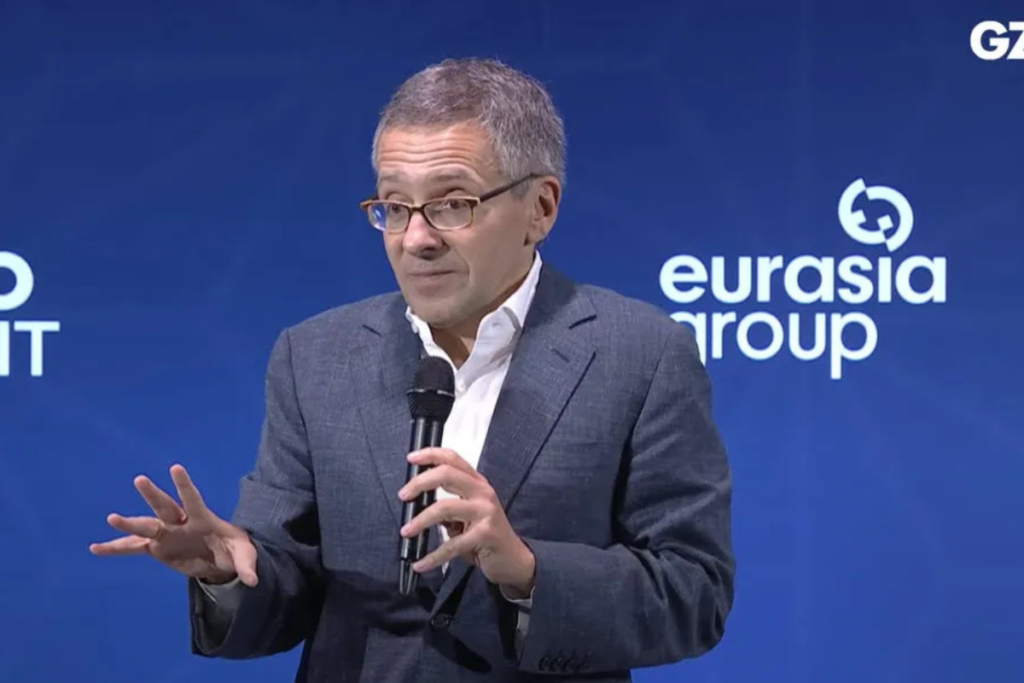Bremmer Warns of Global Power Vacuum
Ian Bremmer delivered his “State of the World” address in Tokyo on October 23rd at Eurasia Group’s annual GZERO Summit. In Japan, attention is focused on China’s military threat to Taiwan. However, Bremmer highlighted what he believes is the more urgent threat: the growing vacuum in global leadership.
Earlier this month China raised regional concerns by conducting a series of military exercises under the “Joint Sword-2024B” operation. These drills included naval ships and aircraft surrounding Taiwan from multiple directions, aimed at practicing blockade scenarios and assault strategies.
The drills are seen as part of China’s broader strategy to assert control over Taiwan, raising fears that China might actually use force to gain control. Such action would destabilize the region, likely triggering a broader conflict involving Japan and the United States.
Bremmer, in contrast, said discussion of military action against Taiwan appears to be softening. Chinese officials are no longer firmly fixed on 2027 as a critical date for resolving the Taiwan issue. China, he noted, is grappling with its worst economy in decades and has quietly pushed back its internal timeline for surpassing the US economy by five years.
Meanwhile, the United States remains deeply distracted by multiple crises. Secretary of State Antony Blinken has made perhaps eleven trips to the Middle East recently, compared to just two visits to Asia. The upcoming US presidential election threatens to further consume American attention and resources, with both sides likely to challenge the results through lawsuits and claims of election illegitimacy. In this environment, neither power appears positioned or inclined to pursue the kind of sustained confrontation a new Cold War would require, much less actual military conflict.
Bremmer warns that this relative stability masks a more insidious threat: the absence of global leadership. He points to the current conflicts in Ukraine and Gaza as prime examples. The US has failed to use its considerable influence with Israel to help end the Gaza conflict. China also has done little to restrain Russia’s actions in Ukraine. “None of the major conflicts in the world are … headed towards a sustainable resolution,” Bremmer added.

For Japan, this global leadership vacuum poses particular challenges. The country has historically relied on consistent US leadership in areas such as global security, free trade, democracy promotion and rule of law. But recent years have seen the US repeatedly shift positions on major international agreements – from the Trans-Pacific Partnership to the Paris Climate Accord. US inconsistency creates uncertainty for allies such as Japan which ultimately worry if the US will stand by historic security guarantees.
Looking ahead, Bremmer suggests this American unreliability will only increase. While the anticipated post-election political dysfunction may not severely impact America’s economic strength or geopolitical security, it will further diminish US capacity for global leadership over the next five years.
Despite these challenges, Bremmer sees reason for optimism in several areas. Globalization, far from being over, continues to advance. The global middle class now comprises more than half the world’s population, with tens of millions of people being lifted from poverty annually. International trade and travel continue to grow despite headwinds.
Moreover, the US-China relationship has achieved a kind of functional balance in key technological areas. The US leads in artificial intelligence and the shift toward AI decision-making, while China dominates in renewable energy and the transition to a post-carbon future. This creates a natural buffer against conflict, he suggests, as developing countries refuse to fully align with either power. Instead, they maintain relationships with both to access critical technologies.
Bremmer also highlights AI’s potential to address global inequalities. While AI may further enrich a small elite, it also promises to provide unprecedented access to education, healthcare and economic opportunities for previously marginalized populations. He cites India as an example, where AI could help the bottom billion of the population access services and opportunities previously limited to the country’s middle and upper classes.
For Japan, these developments create both opportunities and imperatives. He argues that Japan must step up to take a greater leadership role. This includes building inclusive regional architecture that can engage with China while maintaining strong ties with the US. Such a balanced approach becomes increasingly crucial as US reliability becomes more uncertain.
Bremmer’s message for Japan is clear: waiting for the return of strong US global leadership is no longer an option. Developing its own capacity for regional leadership will require significant effort from Japan’s government, industry and thought leaders.
The world he describes is one of paradox: unprecedented opportunities alongside dangerous leadership vacuums, continuing globalization alongside growing geopolitical tensions, and technological advancement alongside political dysfunction. For Japan, navigating this complex landscape will require both wisdom and courage.
The country can no longer rely solely on the US. Instead, it must help shape a new international order. This new order must harness opportunities while managing the risks of our “GZERO” world, he says. The question is whether Japan is able to take on this challenge.
Richard Solomon is an author, publisher, and spokesman on contemporary Japan. He posts Beacon Reports at www.beaconreports.net.

